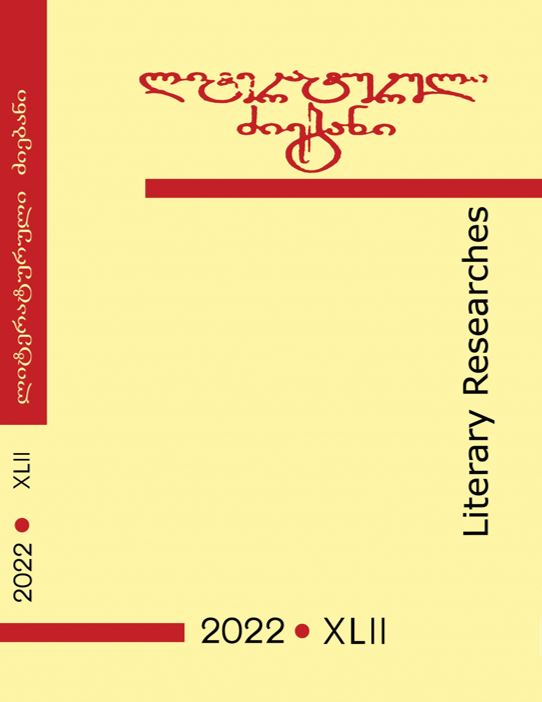Published 2022-04-30
Keywords
- 19th century,
- Georgian literature,
- Giorgi Tsereteli,
- Third group (“Dasi”),
- “Kvali”
How to Cite
Abstract
In the second half of the 19th century, the existence of numerous literary schools and groups in Georgia, from the writings and criticisms point of view, required an assessment of the main problems of literary theory. “Giorgi Tsereteli witnessed and participated in the public life and activities of existing groups. Some of them got their official names from him. That’s why, in many cases, Tsereteli’s statements are of primary importance for the history of groups (“Dasi”)” Giorgi Tsereteli had to live in a historically very difficult and turbulent era. The question was about who among the Georgian figures at that time understood how and what path he chose to create a better future for the nation. Therefore, it is natural that there is a difference of opinion according to the challenges of the time.
Giorgi Tsereteli is one of the first who gave us the characterization and classification of the first, second, and third group (“Dasi”). Back in 1894, in his speech at the funeral of Egnate Ninoshvili, he was the first to “baptize” the new ideological-literary group as the “third group (“Dasi”)”, which entered the history of Georgian literature and public thought of the 19th century under this name.
According to the author, every magazine-newspaper has its position and has a loyal group of readers. The reader will also look at the events only through their eyes. Editors also refer to opposing magazines and newspapers “disrespectfully”, therefore, “together with Georgian publications, various readerships have been established”, where the party struggle has the same ground as in Europe – concludes Tsereteli. Fortunately, the author continues to argue, a significant part of the nation is not involved in this controversy and evaluates the events objectively. The unapproachable reader has such a curious mind that he can easily distinguish truth and lies from one another. Giorgi Tsereteli’s desire is that Georgian publications find out their direction and program according to the circumstances and “effort”, and the readers “standing outside” of the groups will “sincerely recognize” and support the preacher of truth. According to the author, we should not be afraid of the fight against the groups (“Dasi”), because “whoever the nation favors, sooner or later the ball and the field will remain with him”.
Tsereteli’s goal is to support all measures that could unite, strengthen, politically and economically empower the Georgian nation. And fierce resistance was to be met with all attempts to “dominate” one part over another. Therefore, Tsereteli does not sympathize, and moreover, as a matter of principle, he insists that “every institution” should not be called only noble, or only peasant or merchant. It is the author’s dream that the son of a noble
and a peasant should study together in the military school, that the peasant and the nobleman should be judged together in the village administration and in the court. All common capital, regardless of its form, whether it is a bank or a savings association, industrial credit, should function for everyone and bear the name of a Georgian institution, not a civil or rural one, but a public one,
until the Georgian nation received equal rights among other nations. It was these national principles that “Kvali” put forward, and that’s why they called their supporters the third group (“Dasi”) – the author explains. According to Tsereteli, it is widely known that two troupes already existed and “operated” in Georgian literature and public life, that’s why “Kvali” called their new movement the third group (“Dasi”). We would also like to note that Giorgi Tsereteli considered himself part of the “cultural generation” of the second group (“Dasi”), which waited a long time for the third group (“Dasi”), and it eventually came.
In our opinion, Giorgi Tseretelis’ prioritization of the public importance and ideological load of writing indicates the initial stage of the formation of a new paradigm of critical thinking, which is completely consistent with the general cultural situation of that time.
Later, the models built on the chronological-ideological principle of
systematization of the literary process and periodization of the history of writing had a great impact on Marxist criticism and the formation of Soviet literary studies. We hope to dwell on this issue in more detail in the future.

